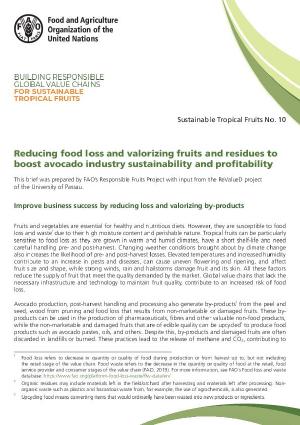
Reducing food loss and valorizing fruits and residues to boost avocado industry sustainability and profitability
22/05/2024
Avocados, like other tropical fruits, are susceptible to food loss and waste due to their high moisture content and perishable nature. Factors including climate change, inadequate infrastructure and handling during harvesting, packaging and transportation increase the risk of food loss, impacting fruit supply and quality.
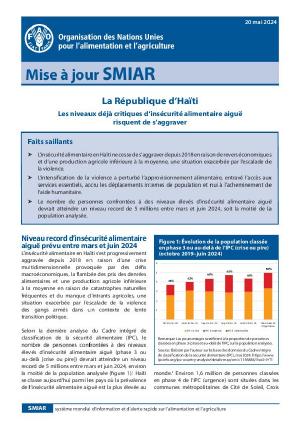
GIEWS Update – The Republic of Haiti, 20 May 2024
20/05/2024
Food insecurity in Haiti has been worsening since 2018 due to economic setbacks and below‑average agricultural production, exacerbated by escalating violence. Heightened violence has disrupted food supply, hindered access to essential services, increased internal displacements of people and affected delivery of humanitarian assistance.
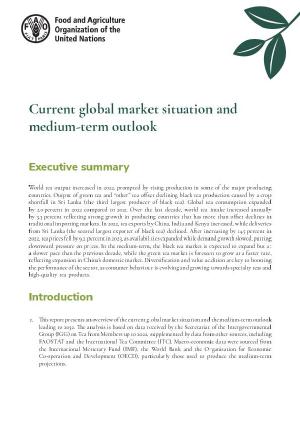
Current global market situation and medium term outlook
16/05/2024
World tea output increased in 2022, prompted by rising production in some of the major producing countries. Output of green tea and “other” tea offset declining black tea production caused by a crop shortfall in Sri Lanka (the third largest producer of black tea). Global tea consumption expanded by 2.0 percent in 2022 compared to 2021, underpinned by strong import demand.
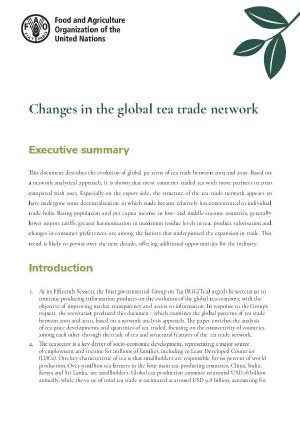
Changes in the global tea trade network
16/05/2024
This document describes the evolution of global patterns of tea trade between 2005 and 2020. Based on a network analytical approach, it is shown that most countries traded tea with more partners in 2020 compared with 2005. Especially on the export side, the structure of the tea trade network appears to have undergone some decentralization, in which trade became relatively less concentrated in individual trade hubs.
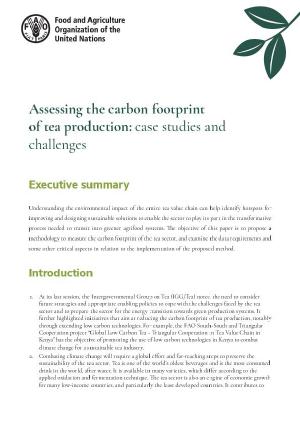
Assessing the carbon footprint of tea production: case studies and challenges
16/05/2024
Understanding the environmental impact of the entire tea value chain can help identify hotspots for improving and designing sustainable solutions to enable the sector to play its part in the transformative process needed to transit into greener agrifood systems. The objective of this document is to propose a methodology to measure the carbon footprint of the tea sector, and examine the data requirements and some other critical aspects in relation to the implementation of the proposed method.
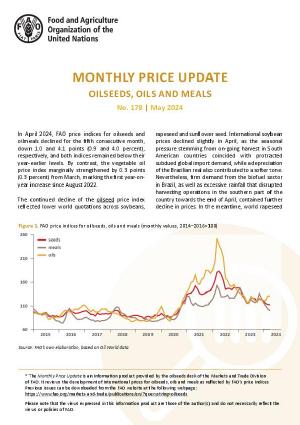
Oilseeds, Oils and Meals. Monthly price update No. 178, May 2024
14/05/2024
The Monthly Price Update is an information product provided by the oilseeds desk of the Markets and Trade Division of FAO. It reviews the development of international prices for oilseeds, oils and meals as reflected by FAO’s price indices. In April 2024, the FAO price indices for oilseeds and oilmeals both declined for the fifth consecutive month, whereas the vegetable oil price index marginally strengthened from the previous month.
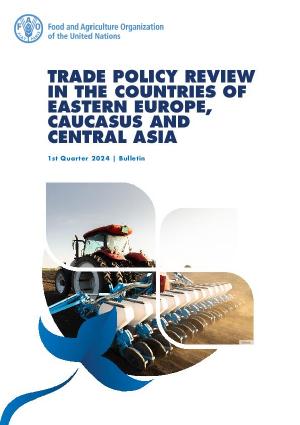
Trade policy review in the countries of Eastern Europe, Caucasus and Central Asia. 1st Quarter 2024 | Bulletin
13/05/2024
This quarterly bulletin features agricultural trade policy changes in the region. It provides current trade measures, agreements, statistics and articles by experts covering trade-related issues in countries across the region, and it is sent to members of the Agricultural Trade Expert Network.
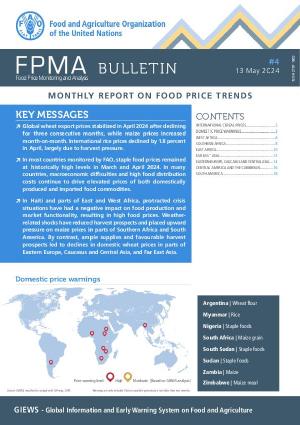
Food Price Monitoring and Analysis (FPMA) Bulletin #4, 13 May 2024 - Monthly report on food price trends
13/05/2024
Global wheat export prices stabilized in April 2024 after declining for three consecutive months, while maize prices increased month‑on-month. International rice prices declined by 1.8 percent in April, largely due to harvest pressure. In most countries monitored by FAO, staple food prices remained at historically high levels in March and April 2024.
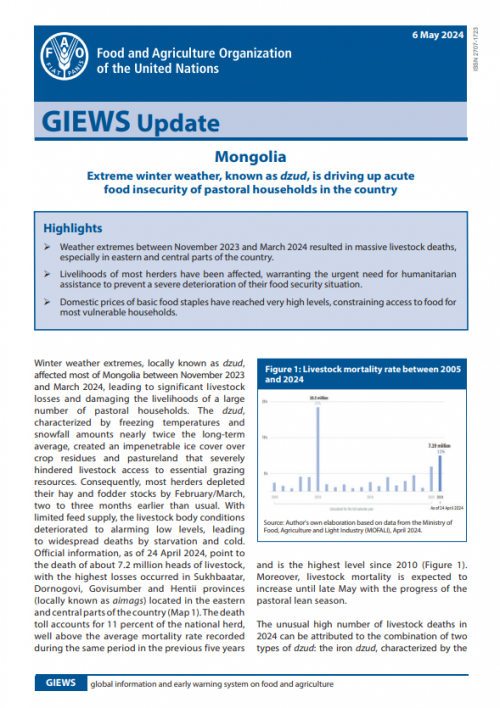
GIEWS Update - Mongolia, 6 May 2024
06/05/2024
Weather extremes between November 2023 and March 2024 resulted in massive livestock deaths, especially in eastern and central parts of the country. Livelihoods of most herders have been affected, warranting the urgent need for humanitarian assistance to prevent a severe deterioration of their food security situation. Domestic prices of basic food staples have reached very high levels, constraining access to food for most vulnerable households.
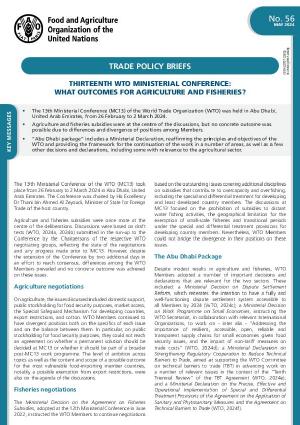
No. 56 Thirteenth WTO Ministerial Conference: what outcomes for agriculture and fisheries?
06/05/2024
The 13th Ministerial Conference of the WTO (MC13) took place from 26 February to 2 March 2024 in Abu Dhabi, United Arab Emirates. The Conference was chaired by the Minister of State for Foreign Trade of the host country. Agriculture and fisheries subsidies were once more at the centre of the deliberations, but no concrete outcome was possible due to differences and divergence of positions among Members
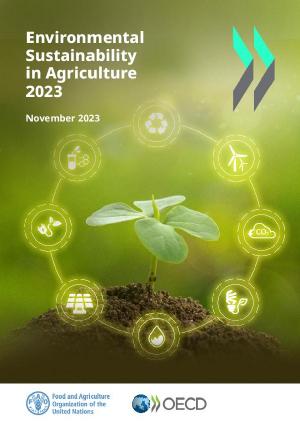
Environmental sustainability in agriculture 2023
01/05/2024
This note provides a brief overview of the environmental impacts of agriculture, discusses how agricultural policies affect the environment, and identifies policy responses to foster agricultural productivity while reducing the sector’s environmental footprint.
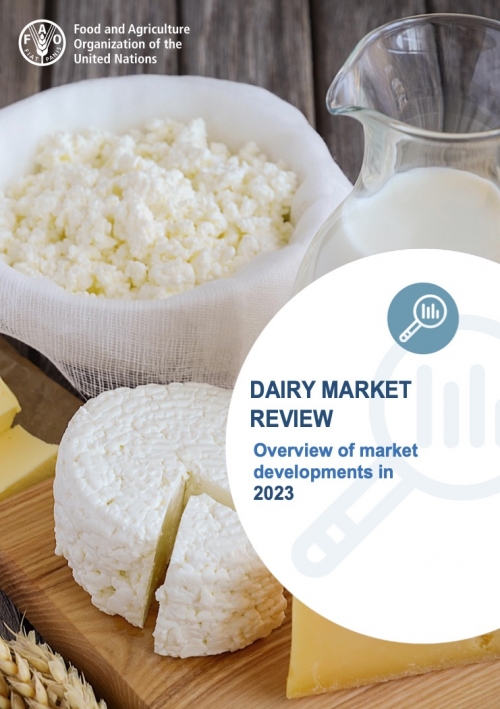
Dairy Market Review. Overview of global market developments in 2023
23/04/2024
The April issue of the publication summarizes the salient trends and drivers of market developments in 2023. The review finds that international dairy prices weakened significantly in 2023. Additionally, global milk production expanded at a slightly faster pace in 2023 and international dairy trade contracted for the second consecutive year, albeit slower than the previous year.
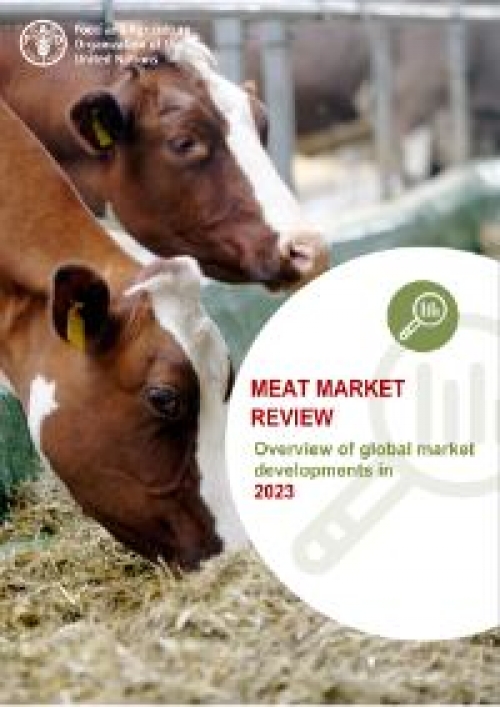
Meat Market Review. Overview of global market developments in 2023
22/04/2024
The April issue of the publication summarizes the salient trends and drivers of market developments and significant public policy changes in 2023. The review shows that world meat production increased in 2023, reflecting production increases across all meat types, driven by favourable production conditions in some producing regions.
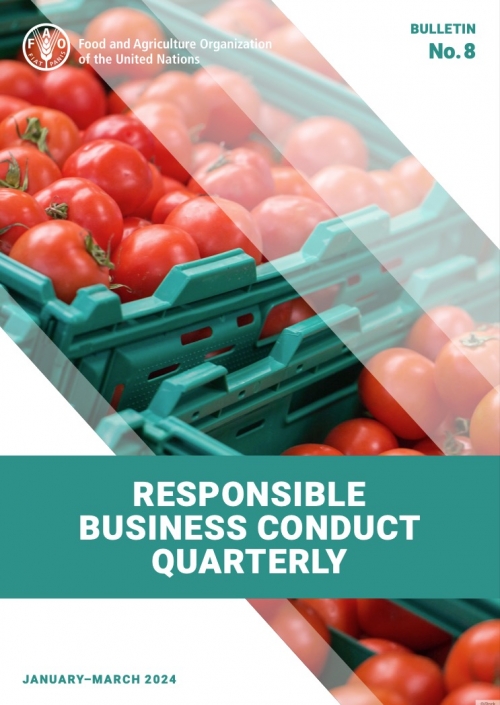
Responsible Business Conduct Quarterly. Bulletin No. 8, January–March 2024
16/04/2024
FAO’s Responsible Business Conduct Quarterly Bulletin (RBC-Q) shares events and resources on FAO’s activities on Responsible Global Value Chains and news from around the world related to business, risk and development in the agricultural sector. It is prepared by FAO’s Markets and Trade Division (EST). This issue of the bulletin covers the period January–March 2024.
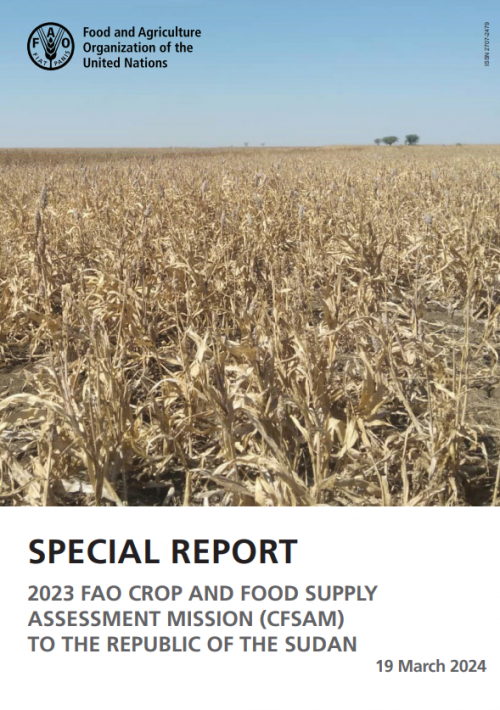
Special report – 2023 FAO Crop and Food Supply Assessment Mission (CFSAM) to the Republic of the Sudan
15/04/2024
Between 2 and 17 January 2024, following a request by the Ministry of Agriculture and Forestry (MoA&F), the Food and Agriculture Organization of the United Nations (FAO), in close cooperation with the Food Security Technical Secretariat (FSTS) and the State Ministries of Agriculture, carried out its annual Crop and Food Supply Assessment Mission (CFSAM) to estimate the 2023 crop production and assess the food supply situation throughout the 18 states of the country.
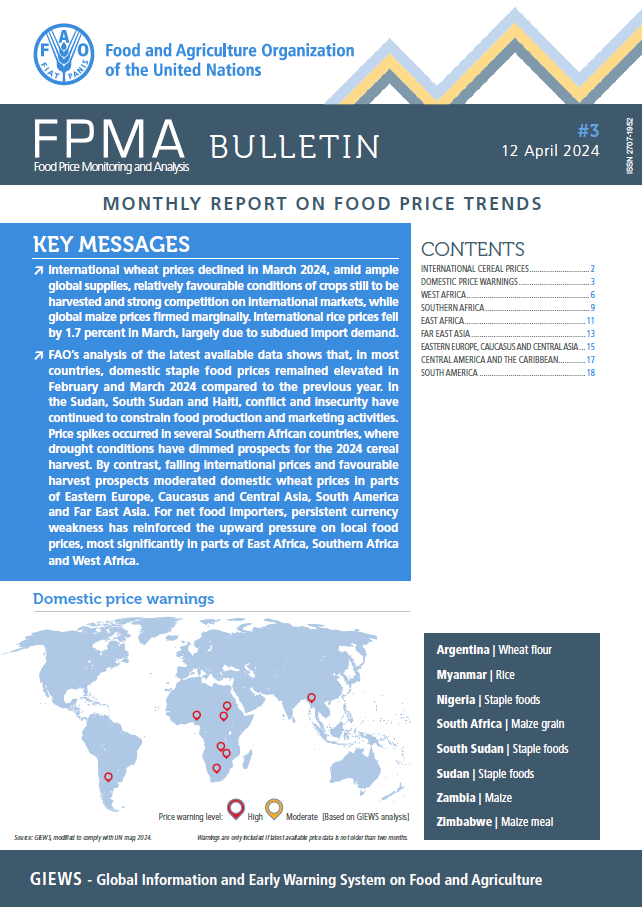
Food Price Monitoring and Analysis (FPMA) Bulletin #3, 12 April 2024 - Monthly report on food price trends
12/04/2024
International wheat prices declined in March 2024, amid ample global supplies, relatively favourable conditions of crops still to be harvested and strong competition on international markets, while global maize prices firmed marginally. International rice prices fell by 1.7 percent in March, largely due to subdued import demand.
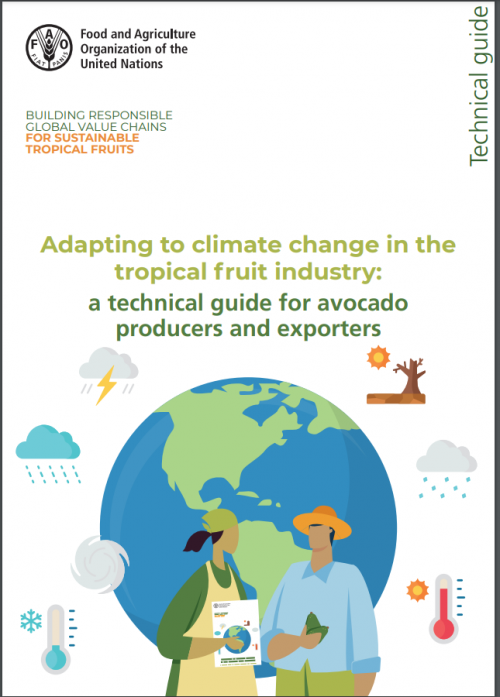
Adapting to climate change in the tropical fruit industry: a technical guide for avocado producers and exporters
12/04/2024
Climate change is impacting global food production systems, making the challenge of feeding the world’s growing population more difficult than ever before. The tropical fruit sector is particularly at risk from the negative impacts of climate change driven by rising temperatures, extreme weather events, and associated challenges such as water stress and increased pests and diseases.
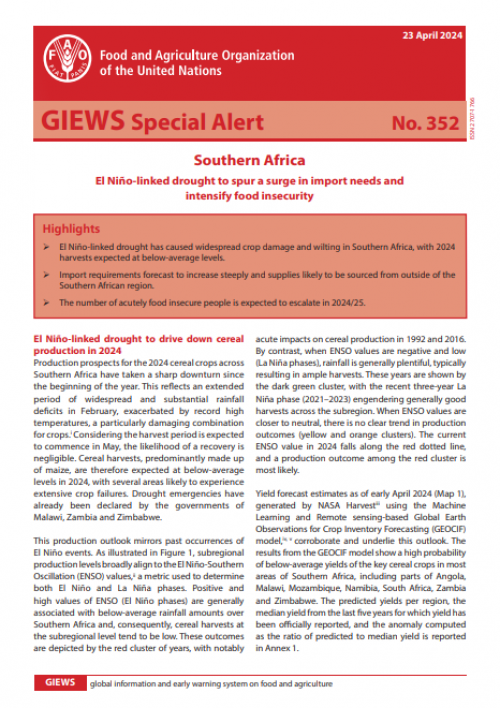
GIEWS Special Alert No. 352 - Southern Africa, 23 April 2024
10/04/2024
El Niño-linked drought has caused widespread crop damage and wilting in Southern Africa, with 2024 harvests expected at below-average levels. Import requirements forecast to increase steeply and supplies likely to be sourced from outside of the Southern African region. The number of acutely food insecure people is expected to escalate in 2024/25.
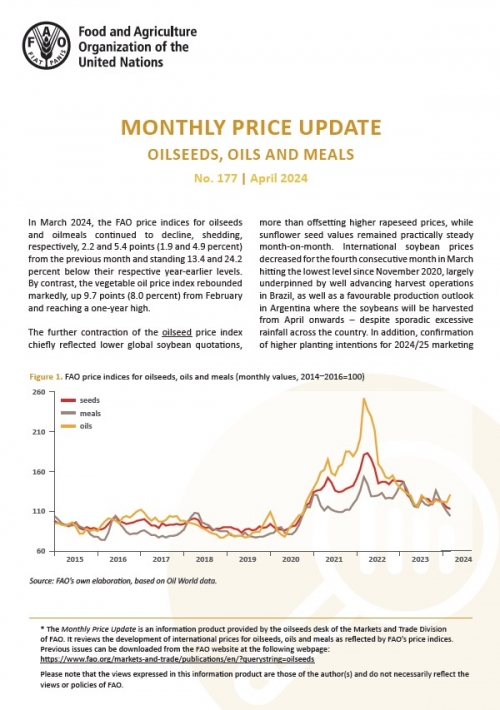
Oilseeds, Oils & Meals. Monthly price update no. 177, April 2024
05/04/2024
The Monthly Price Update is an information product provided by the oilseeds desk of the Markets and Trade Division of FAO. It reviews the development of international prices for oilseeds, oils and meals as reflected by FAO’s price indices.In March 2024, the FAO price indices for oilseeds and oilmeals continued to decline, whereas the vegetable oil price index rebounded markedly from the previous month.
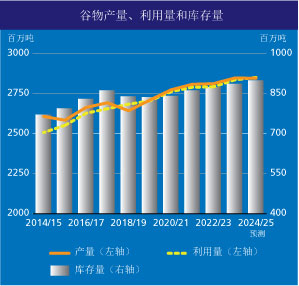
FAO Cereal Supply and Demand Brief
05/04/2024
The Cereal Supply and Demand Brief provides an up-to-date perspective of the world cereal market. The monthly brief is supplemented by a detailed assessment of cereal production as well as supply and demand conditions by country/region in the quarterly Crop Prospects and Food Situation. More in-depth analyses of world markets for cereals, as well as other major food commodities, are published biannually in Food Outlook.
